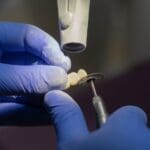If you’ve recently gotten a new dental implant, or are planning to get one, congratulations! You’ve made an excellent choice to replace your missing tooth with a superior alternative, which should last for many years if you care for it properly.
After you’ve gone through the time and expense of getting a dental implant, you’ll want to protect your wise investment by caring for it properly, which begins right after you return home from your implant procedure.
Bone Graft Care
If your jawbone was not strong enough to retain an implant, you may need to undergo a bone graft procedure. This is a type of surgery performed under anesthesia to shore up the area so that it can accept a dental implant.
When returning home after your bone graft procedure, use any pain medications or antibiotics as directed. Do not disturb the surgical site so that the area can heal properly. Avoid strongly chewing, rinsing, or spitting to prevent bleeding or infection.
When the bleeding is stopped, you can began eating soft foods. Call your dentist right away if bleeding worsens or resumes.
Dental Implant Care
Considering that a dental implant is virtually indestructible, it can be tempting to ease up on your oral care routine. However, although implants are strong, the area around them can still be undermined by tooth decay and gum disease.
Immediately After
When you return home from your dental implant procedure, the surgical area may be somewhat tender and sensitive at first. Avoid abrasive toothpastes and those with intense flavors, like cinnamon or mint, as these can irritate the soft tissues around your new implant.
If the implant site is sensitive at first, you may want to try a special toothpaste for tooth sensitivity until the area returns to normal.
Brush and Floss
As mentioned earlier, the area around your new dental implant needs to be cared for properly so that the gums and bone supporting the implant are not undermined. So be sure that you are keeping up with your regular brushing and flossing routine so that your new implant, and all of your teeth, remains healthy and viable.
Avoid Smoking
In addition to causing various health problems, smoking can damage your teeth by staining them. Smoking also impairs the healing process, which can take up to six months after an implant procedure.
If you are smoker, this would be a great opportunity to quit. Otherwise, limit your smoking is much as possible so that the surgical site can heal without complications or unnecessary delay.
Schedule Regular Dental Visits
Your dentist will probably want to see you soon after your implant procedure to check on your progress. It’s also extremely important that you maintain your routine dental exam and cleaning appointments. This ensures that your dental team has a chance to examine your teeth and mouth to head off any problems with your new implant before they develop.
You can also have plaque and tartar regularly removed at your cleaning appointments to ensure that the area around your dental implant is free of tooth decay and gum disease.









